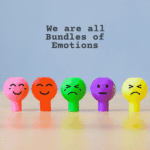
Emotional Intelligence: The Master Key to Success in the Age of AI
Emotional Intelligence (EI) is the vital life skill that determines your success in every sphere—from career to relationships. It’s the ability to Identify, Understand, and Manage the Thoughts, Feelings, and Emotions of yourself and those around you.
Table Of Content
- The Importance of Emotional Intelligence (EI)
- EI: More Crucial Than IQ for Success
- Understanding Emotions: The Neuroscience
- How Emotions are Processed in the Brain
- The Power of Regulated Responses
- EI in Key Spheres of Life
- EI in Relationship
- EI in Sales & Marketing
- EI in Career & Business
- EI and Overall Well-being
- Improving Emotional Intelligence: The 5 Components
- Conclusion
The Importance of Emotional Intelligence (EI)
We are all creatures of emotion. Whether we realize it or not, emotions, not just logic, provide the final push for most of our major decisions—be it buying a product, opting for a career or choosing a life partner. Better decisions can be made if we are able to effectively manage our emotions and recognize the emotions of others around us
EI: More Crucial Than IQ for Success
It is widely believed that Emotional Intelligence is four times more important than cognitive intelligence (IQ) for success in life. The reason is simple: the most essential skill for achievement is the ability to manage people.
- Business Leaders manage teams, customers, and suppliers.
- Employees handle colleagues, superiors, and clients.
- Personal Life requires building trust and bonding with family and partners.
Since every interaction involves handling people, Emotional Intelligence is the ultimate people skill. This explains why individuals with comparatively lower IQs often achieve greater success—they excel at handling human dynamics.
Understanding Emotions: The Neuroscience
An Emotion is your body’s reaction to an event, situation, or thought (internal or external). This reaction causes physiological changes (like heart rate shifts) and a specific behavioral response (like a smile or shouting).
How Emotions are Processed in the Brain
It would be helpful to understand how emotions are generated & processed in our brain. Understanding the neuroscience of emotions allows us to practice better emotional regulation. We can focus on the relevant part of brain to regulate & manage emotions . This can be done through Meditation.

The key area is the Limbic System, which includes the Amygdala, Hypothalamus, and Hippocampus.
Sensory information, be it Smell, Sight, Sound, Taste or Touch, travels in the form of electric signals . It passes through Spinal Chord & reaches Brain. In Brain, the information first passes through The Limbic System & then reaches the front part of the Brain, The Cortex.
- The Amygdala (Emotion Generator): This part of the limbic system is responsible for generating basic emotions like Fear and Anger. When unregulated, the Amygdala can “hijack” the brain, leading to instantaneous, often regrettable, emotional reactions.
- The Pre-frontal Cortex (Emotion Regulator): This is the seat of logic, reasoning, and decision-making. It identifies the intensity of an emotion and determines the appropriate, balanced response to a situation.
Emotional Intelligence is achieved when the Limbic System and the Pre-frontal Cortex work in harmony, preventing instinctive overreaction.
The Power of Regulated Responses
Emotional Intelligence determines our response to life’s situations. The difference is clear: some people fret over a traffic jam, while emotionally intelligent individuals use the break to practice mindfulness.
As the famous quote goes, “Life is only 10% of what happens to us and 90% of how we react to what happens to us.” We cannot always control situations, but we can always control our reaction. Emotional Intelligence is the key to that emotional regulation.
EI in Key Spheres of Life
Emotional Intelligence is vital for success and overall well-being across all walks of life:
EI in Relationship
Relationships are built around emotions. EI is essential to continually nurture Love, Trust, and Intimacy by providing a deeper understanding of others’ feelings and needs.
EI in Sales & Marketing
Why do some sales professionals consistently outperform others selling the same product? It’s their superior Emotional Intelligence, which allows them to build rapport and establish trust with customers. Decisions, after all, are 95% driven by emotions.
EI in Career & Business
All careers require managing teams, handling subordinates and superiors, and managing work-related stress. EI is the core competency for achieving the best results in any professional environment.
EI and Overall Well-being
Emotionally intelligent people are fundamentally healthier and happier. Unregulated negative emotions contribute to or worsen chronic health issues (heart disease, high blood pressure) and mental health issues (depression, anxiety).
Improving Emotional Intelligence: The 5 Components
According to psychologist Daniel Goleman, Emotional Intelligence can be improved by building competency around these five core components:
- Self-Awareness: Understanding your own feelings, moods, and emotions.
- Self-Regulation: The ability to control and manage your own emotions and reactions.
- Motivation: The inner drive to pursue goals and achieve success.
- Empathy: The ability to understand and share the feelings and emotions of others.
- Social Skills: The ability to manage relationships, communicate effectively, and build social networks.
In addition to building these competencies, practicing Deep Breathing and Meditation are powerful tools to regulate The Limbic System and improve your Emotional Intelligence.
Conclusion
In the Age of Artificial Intelligence, Emotional Intelligence is the most crucial life skill for living a life of Fulfillment, Growth, and Happiness.
Remember the true definition of mastery: “Anyone can get angry, but to be angry at the right time, for the right reason, with the right person, in the right manner, and up to the right extent… That’s Emotional Intelligence.“



